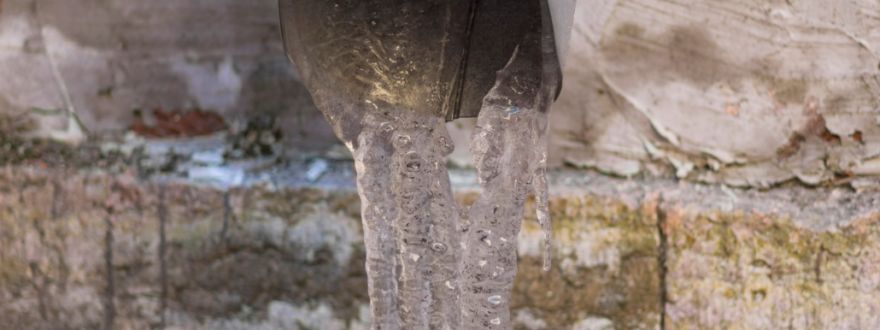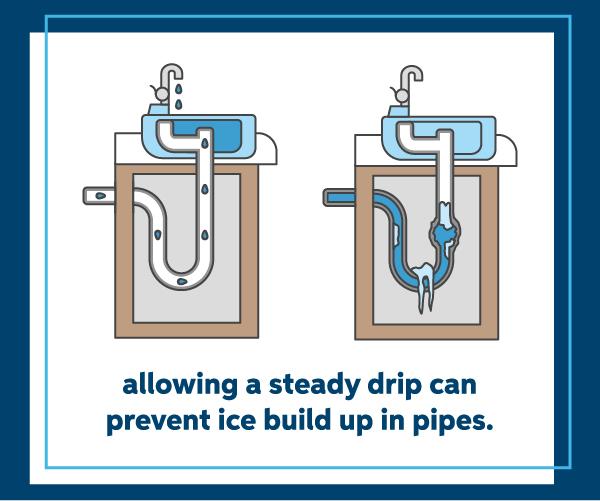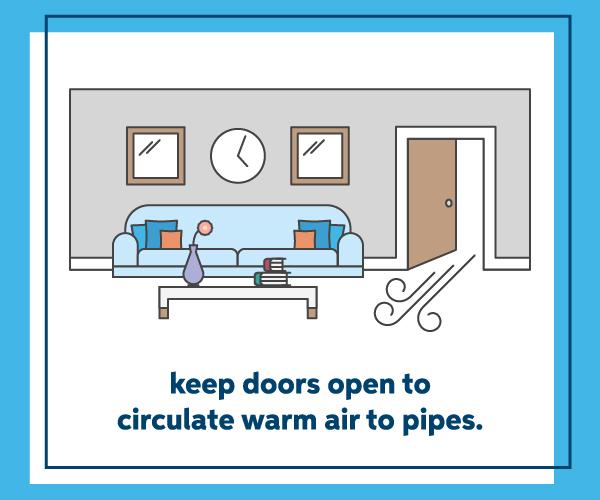
Let’s break the ice. Haha, see what we did there?
We talked to our claims team about freezing pipes because they see firsthand how devastating damage from frozen pipes can be on homes.
From their answers, we put together this helpful list on how you can keep your pipes from freezing and the safest way to fix them if it does happen.
Here’s our Q&A with our claims team all about what homeowners need to know about freezing pipes:

Q: What can homeowners do to prevent pipes from freezing?
A: Two things: leave your faucets dripping and open interior room and cabinet doors.
Turns out the old adage “leave your faucet dripping” when severe cold weather hits has some truth to it!
When pipes freeze and break, it’s usually not from the pressure of the ice. In most cases, it’s the ice expanding inside the pipe and blocking the remaining water. Then, water pressure may build to the point of the pipe splitting. If you give even a little bit of that water a place to go, you may be able to reduce your chances of your pipes freezing and bursting.
Second, leave the doors to interior rooms and cabinets open (vanities, sinks, etc.). This promotes warm airflow to areas of your home that would normally be much colder. Even rooms that don’t have pipes can help warm air circulation.
Q: Do frozen pipes always burst?
A: Not always, but there is the potential of bursting.
If you’re able to turn off the water supply quickly, you may be able to avoid a split pipe. However, be cautious about turning your water back on. There may be other frozen sections of your plumbing that you can’t see.
If you decide to turn your water back on and there are other frozen areas, you may find yourself with far more damage than you started.
Q: How can homeowners fix a frozen pipe?
A: The best advice we can safely give is to immediately turn off the water supply to your house and contact a professional.
Now before you roll your eyes, let us explain.
Yes, you’ve probably heard about people thawing pipes themselves, but there’s actually a big risk in that. You may have found one or two areas that froze but there may be others. When you thaw just the spots you can see and turn your water back on, you may very well be rushing water to other frozen or even burst pipes you didn’t know about. This can lead to water flowing into your house from several breaks in your plumbing system. Which is what we call a recipe for disaster!
 Q: What is something you wish more homeowners knew?
Q: What is something you wish more homeowners knew?
A: Turning the thermostat down considerably may be contributing to frozen pipes.
If you are going to be away for more than a couple days, you may think about turning down your thermostat to save on energy costs. You’re not alone; many homeowners do this.
But, here’s the issue, if there isn’t enough warm air circulating in your house, you run the risk of your pipes freezing. Most of your pipes are under vanities or behind cabinet doors, which already makes it difficult for any warm air to get into. So, when you lower the heat in your home, those pipes obviously get even less warm airflow. In the end, the overall energy cost savings from lowering your thermostat is often not worth the headache of the repair process.
Q: Does my homeowners insurance cover damage from frozen pipes?
A: It does! Your policy covers damage to the pipe(s) caused by freezing and it may cover water damage that results from water escaping from the damaged pipe. Keep in mind that your policy may require your pipes be drained and/or heat maintained in your home for coverage to apply.
(Please note: There are specific policy provisions that affect this coverage for vacant homes, and homes under construction.)
Auto-Owners Insurance Company © 2021. All Rights Reserved.
Disclaimer: The analysis of coverage is in general terms and is superseded in all respects by the Insuring Agreements, Endorsements, Exclusions, Terms and Conditions of the Policy. Some of the coverage mentioned in this material may not be applicable in all states or may have to be modified to conform to applicable state law. Some coverages may have been eliminated or modified since the publishing of this material. Please check with your local Independent Auto-Owners Insurance Agent for details.© 2022 Auto-Owners Insurance. All Rights Reserved.






